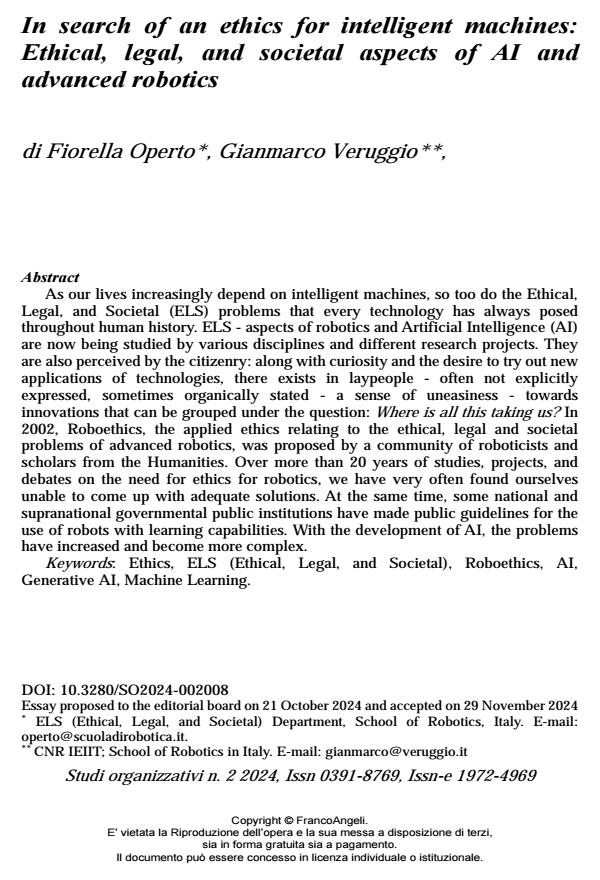In search of an ethics for intelligent machines: Ethical, legal, and societal aspects of AI and advanced robotics
Titolo Rivista STUDI ORGANIZZATIVI
Autori/Curatori Fiorella Operto, Gianmarco Veruggio
Anno di pubblicazione 2025 Fascicolo 2024/2
Lingua Inglese Numero pagine 23 P. 152-174 Dimensione file 163 KB
DOI 10.3280/SO2024-002008
Il DOI è il codice a barre della proprietà intellettuale: per saperne di più
clicca qui
Qui sotto puoi vedere in anteprima la prima pagina di questo articolo.
Se questo articolo ti interessa, lo puoi acquistare (e scaricare in formato pdf) seguendo le facili indicazioni per acquistare il download credit. Acquista Download Credits per scaricare questo Articolo in formato PDF

FrancoAngeli è membro della Publishers International Linking Association, Inc (PILA), associazione indipendente e non profit per facilitare (attraverso i servizi tecnologici implementati da CrossRef.org) l’accesso degli studiosi ai contenuti digitali nelle pubblicazioni professionali e scientifiche.
As our lives increasingly depend on intelligent machines, so too do the Ethical, Legal, and Societal (ELS) problems that every technology has always posed throughout human history. ELS - aspects of robotics and Artificial Intelligence (AI) are now being studied by various disciplines and different research projects. They are also perceived by the citizenry: along with curiosity and the desire to try out new applications of technologies, there exists in laypeople - often not explicitly expressed, sometimes organically stated - a sense of uneasiness - towards innovations that can be grouped under the question: Where is all this taking us? In 2002, Roboethics, the applied ethics relating to the ethical, legal and societal problems of advanced robotics, was proposed by a community of roboticists and scholars from the Humanities. Over more than 20 years of studies, projects, and debates on the need for ethics for robotics, we have very often found ourselves unable to come up with adequate solutions. At the same time, some national and supranational governmental public institutions have made public guidelines for the use of robots with learning capabilities. With the development of AI, the problems have increased and become more complex.
Mentre la nostra vita dipende sempre più dalle macchine intelligenti, si pongono anche problemi etici, legali e sociali (ELS) che ogni tecnologia ha sempre posto nel corso della storia umana. Gli aspetti ELS della robotica e dell’intelligenza artificiale (IA) sono oggi oggetto di studio da parte di varie discipline e di diversi progetti di ricerca. Questi vengono percepiti anche dalla cittadinanza: accanto alla curiosità e al desiderio di sperimentare nuove applicazioni delle tecnologie, esiste nelle persone non addette ai lavori – spesso non esplicitamente espresso, talvolta chiaramente dichiarato – un senso di disagio nei confronti di innovazioni che possono essere raggruppate in una sola domanda: Dove ci porterà tutto questo? Nel 2002, la Roboetica, l’etica applicata ai problemi etici, legali e sociali della robotica avanzata, è stata proposta da una comunità di robotisti e studiosi di scienze umane. In oltre 20 anni di studi, progetti e dibattiti sulla necessità di un’etica per la robotica, molto spesso non siamo riusciti a trovare soluzioni adeguate. Allo stesso tempo, alcune istituzioni governative pubbliche nazionali e sovranazionali hanno pubblicato linee guida per l’uso di robot con capacità di apprendimento. Con lo sviluppo dell’IA, i problemi sono aumentati e diventati più complessi.
Parole chiave:Etica, ELS (Etici, legali, e Sociali), Roboetica, IA, IA Generativa, Machine Learning.
Fiorella Operto, Gianmarco Veruggio, In search of an ethics for intelligent machines: Ethical, legal, and societal aspects of AI and advanced robotics in "STUDI ORGANIZZATIVI " 2/2024, pp 152-174, DOI: 10.3280/SO2024-002008